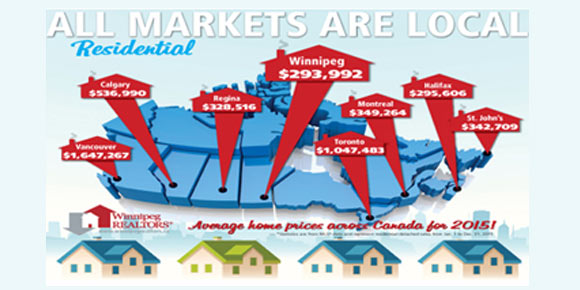The accompanying infographic, which was included in the WinnipegREALTORS® year-end market release, provides ample evidence of just how different and “local” markets are across the country.
The infographic’s map shows the 2015 average residential-detached sales price for major Canadian markets. For example, Vancouver was over $1.6 million, but this past weekend a WinnipegREALTORS® official was told the Greater Vancouver Real Estate Board removes its luxury sales when determining its average sales price. If luxury sales were included, the average price would have been in excess of $2 million.
Toronto’s average was over $1 million, while markets such as Winnipeg and Halifax, with the lowest average residential-detached sales prices, averaged $293,992 and $295,606, respectively.
Not surprisingly, average residential price growth in Canadian markets varied considerably, too.
The Canadian Real Estate Association (CREA) in its year-end market release indicated Greater Vancouver prices were up 11 per cent as were prices in the Fraser Valley. Toronto made double digits at 10 per cent and Hamilton-Burlington came close at nine per cent.
On the other hand, Calgary and Regina prices fell back nearly two per cent. Winnipeg held steady at a modest two per cent price growth. Montreal and Victoria were up a little higher at four per cent and five per cent, respectively.
CREA reported the national average price of a home in December was $454,342, up 12 per cent on a year-over-year basis. When you remove Greater Vancouver and Greater Toronto (most active and expensive markets) from the overall equation, the national average sale price decreases markedly to a far more modest $336,994. This results in a year-over-year gain of five per cent.
Taking it one step further, by removing Ontario and B.C., where there are other high-priced markets and significant sales activity, the average sale price drops under $300,000 to $294,363, a year-over-year decline of two per cent.
Winnipeg joins the rest of Canada when you remove B.C. and Ontario from the national mix. This, of course, is not realistic, but it does point out how skewed the national market becomes when you have these two provinces bringing their collective might and higher prices to the table.
If not demand, CREA states time and time again that not one market behaves the same as there are different forces at play to shape activity.
“An increasingly short supply of listings in Vancouver and Toronto blunted the impact of changes to mortgage regulations announced in December that were aimed at cooling these housing markets,” said CREA president Pauline Aunger in the national association’s recent year-end release. “Buyers there had been expected to bring forward their purchase decisions before new regulations take effect in February 2016, but they faced a growing shortage of supply.
“Meanwhile, supply is ample in many other major urban markets, particularly those where buyers have become cautious amid economic uncertainty. All real estate is local, and Realtors remain your best source for information about sales and listings where you live or might like to in the future.”
You can take it one step further and say that within local markets different property types or neighbourhoods in a market region, prices and sales activity can vary and often do.
For example, in the Winnipeg market, the residential-detached or single-family homes experienced the third best year ever in 2015 with sales of 9,599. Prices were up very modestly to just under $294,000, but this is still the highest average sale price on record.
Whereas for condominiums, which had been reaching new record highs in back-to-back years, 2015 saw a 10 per cent decrease from 1,798 unit sales in 2014. The average sale price also dipped from $239,171 to $236,204.
When the national average house price goes up, it does not mean anything to a local market such as Calgary, which is being negatively impacted by the significant drop in oil prices.
In the end, all real estate markets are local and that will never change.



